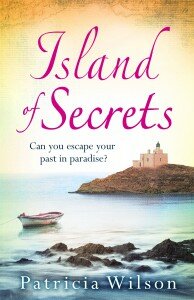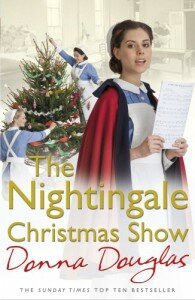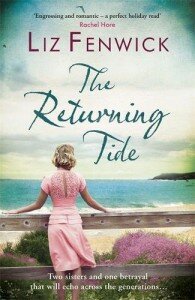Today I’m very pleased to share an extract from Patricia Wilson’s new novel, Island of Secrets, with you. After running her own business for twenty years, Patricia took early retirement and moved to the Greek island of Crete. When she dug up a rusted machine gun in her garden, and the inhabitants of her remote mountain village came with local stories of tragedy and triumph, she knew she had to tell their account of what really happened in September 1943, which became Island of Secrets. Patricia now lives on the island of Rhodes where she is researching and writing her second novel.
‘ The story started at dawn on the fourteenth of September, 1943 . . .’
The story started at dawn on the fourteenth of September, 1943 . . .’
All her life, London-born Angelika has been intrigued by her mother’s secret past. Now planning her wedding, she feels she must visit the remote Crete village her mother grew up in.
Angie’s estranged elderly grandmother, Maria, is dying. She welcomes Angie with open arms – it’s time to unburden herself, and tell the story she’ll otherwise take to her grave.
It’s the story of the Nazi occupation of Crete during the Second World War, of horror, of courage and of the lengths to which a mother will go to protect her children. And it’s the story of bitter secrets that broke a family apart, and of three enchanting women who come together to heal wounds that have damaged two generations.
Extract
The village of Amiras stilled, like a theatre waiting for the curtain to rise. Heat shimmered from the cobbled streets. In front of the kafenion, empty chairs stood in haphazard groups between square tables. Outside the closed supermarket, hessian olive sacks hung over boxes of potatoes and vegetables, protecting them from the fierce Mediterranean light.
A herd of long-haired goats shifted into the shadow of the hilltop chapel. For a few seconds, the dull clatter of their bells broke the peace and quiet of siesta time.
In the lower village, a blue door squeaked open and a wide hipped, middle-aged housewife hurried up the narrow streets. From the shade of a vermillion bougainvillea, a skinny white cat sniffed the air, narrowed its eyes and watched the woman.
Inside one cottage, an elderly couple sat as still and silent as the stone walls. A crucifix hung over a garish icon of Saint George. The martyr seemed distracted from his dragon slaying by an object in the livingroom. A chocolate box overflowed with photographs, letters and mementoes in the centre of a low round table.
The old woman, Maria, reached for a faded picture of Poppy cradling her baby. She studied the image and recalled Poppy’s last words, still fresh in her ears, although decades had passed.
Forget me, Mama. Forget I ever existed.
A shaft of sunlight streamed through the window illuminating Maria’s scarred hands – an ugly reminder of the fire. It took so much time for those wounds to heal.
Her wizened face hardened with a decision.
‘I will write to them, Vassili,’ she said to her husband sitting by the fireplace. ‘Voula can help me.’ She replaced the picture and closed the box. ‘God’s getting impatient, and I’m tired of it all.’ She crossed herself three times and prayer locked her arthritic fingers.
Vassili nodded as though he understood, but passing years had eroded his grief. He dropped his amber worry beads and hobbled to her side.
‘Don’t waste your thoughts on what’s dead and gone, old woman.’ He kissed her forehead.
Despite his words, scenes from the past returned and filled Maria’s head.
‘I can’t forget,’ she whispered, staring at ghosts that crowded into the whitewashed room.
Vassili followed her gaze, unable to see those who haunted her.
Recognising his confusion, Maria wished the spores of old age would moulder her mind too. Regrets were useless now. The time had come for forgiveness and, before she died, Maria hoped to touch the cheek of Poppy’s child.
‘Angelika has a right to know the truth, old man, she’s our granddaughter.’
‘Mama, Papa, your dinner’s here.’ Voula crashed through the doorway, the multi-coloured fly curtain whipping around her faded black dress. She gripped a casserole pot against her belly and grinned, her face a friendly gargoyle.
‘No need to shout, Voula, we’re not deaf,’ Maria said.
Vassili cupped a hand behind his ear. ‘Eh, what’s that? Ah, the food. No chance of any meat I suppose? I’ll be glad when Lent’s over. I can smell the lamb already.’ He shuffled to the kitchen table.
‘Only a few more days until Easter, Papa. I’ve made stuffed peppers. Will you have a glass of Demitri’s wine?’ Voula clattered the dishes and then helped Maria out of the armchair. ‘Anything else?’ she asked, pouring cloudy red krasí into tumblers before serving their meals.
Maria cut open a green pepper, hunched over her plate and sniffed the food.
Voula stopped bustling and watched Maria taste the rice stuffing flavoured with herbs, currants, and pine nuts. When she approved with a nod, Voula took a breath and smiled.
‘I want to write to Poppy and Angelika,’ Maria said flatly.
Voula’s eyes widened. She glanced around the table top and then at Vassili who guzzled his food. ‘Are you sure, Mama?’ She lowered her voice to a whisper. ‘What if it starts up again, the trouble, after all these years? Isn’t it better to forget? We can’t bring back the dead.’
‘No,’ Maria said, her face drawn and thin above the mound of colourful vegetables. ‘I’ve decided.’
***
The next day, Voula asked, ‘How do you want to start the letter, Mama?’ Her pencil poised over a child’s exercise book.
Maria grunted. ‘I’ve thought about it for hours. The beginning is the most difficult part. If it’s not perfect, they’ll screw it up and throw it away. We’ve got one chance at this, Voula. We should address the envelope to Angelika and put both letters in it. Otherwise, I fear her mother might tear it up unopened. Now, let’s see, how shall we begin?’
‘I know, what about: Dear Angelika?’
Maria rolled her eyes. She wondered if her daughter-in-law had lost more of her marbles in sixty-five years than Maria had in ninety. ‘Yes, very good, Voula,’ she snorted. ‘And then?’
Voula lifted and dropped her shoulders, which made her breasts quiver against her belly.
‘Write this then,’ Maria said. ‘I have wanted to send you a letter for a long time. I hoped to see you before I die, but I realise our meeting is unlikely.’
‘Mama!’
‘Oh, face the facts, Voula; I’m on my way out. Let’s get on with the letter before the Angel Gabriel replaces you as my personal assistant.’
Voula scratched her lip and nodded.
‘Now, write this, Voula: Angelika, please tell your mother I have never stopped loving her. Put your arms around her and kiss her from me. Poppy is in my heart. Say that I am sorry. Truly sorry. If I could have changed things, I would.’
‘Mama, how do we know Angelika reads Greek?’
‘We have to trust Poppy will have taught her. Anyway, we can ask Demitri to translate for us. What shall we write next? Perhaps something about Angelika’s father.’ Maria tilted her head to one side. ‘Yeorgo,’ she sighed. ‘Wasn’t he a beautiful man, Voula?’ Silent for a moment, Maria’s eyes glazed. ‘That’s another difficult part. I wonder if Angelika knows.’
Island of Secrets is out now in paperback and ebook formats.
Find out more about Patricia and her writing at: www.pmwilson.net
 The Nightingale Christmas Show is my fourth festive Nightingale novel, so this time I thought it might be fun to put together a collection of interlinked short stories all set around a central theme.
The Nightingale Christmas Show is my fourth festive Nightingale novel, so this time I thought it might be fun to put together a collection of interlinked short stories all set around a central theme. into her life, it transforms her. Frank is handsome, charming and rich, just like a hero from one of Miriam’s favourite romance novels. But is he too good to be true..?
into her life, it transforms her. Frank is handsome, charming and rich, just like a hero from one of Miriam’s favourite romance novels. But is he too good to be true..?

 When twenty-two-year-old Olivia is coerced into marriage by the cruel Alistair Sheldon she leaves England for Egypt, his home and the land of her own childhood. Reluctant as she is to go with Alistair, it’s in her new home that she finds happiness in surprising places: she is reunited with her long-estranged sister, Clara, and falls – impossibly and illicitly – in love with her husband’s boarder, Captain Edward Bertram.
When twenty-two-year-old Olivia is coerced into marriage by the cruel Alistair Sheldon she leaves England for Egypt, his home and the land of her own childhood. Reluctant as she is to go with Alistair, it’s in her new home that she finds happiness in surprising places: she is reunited with her long-estranged sister, Clara, and falls – impossibly and illicitly – in love with her husband’s boarder, Captain Edward Bertram. As the First World War rages in continental Europe, two New York heiresses, Sydney and Brooke Sinclair, are due to set sail for England. Brooke is engaged to marry impoverished aristocrat Edward Thorpe-Tracey, the future Lord Northbrook, in the wedding of the social calendar. Sydney has other adventures in mind; she is drawn to the burgeoning suffragette movement, which is a constant source of embarrassment to her proper sister. As international tempers flare, the German embassy releases a warning that any ships making the Atlantic crossing are at risk.
As the First World War rages in continental Europe, two New York heiresses, Sydney and Brooke Sinclair, are due to set sail for England. Brooke is engaged to marry impoverished aristocrat Edward Thorpe-Tracey, the future Lord Northbrook, in the wedding of the social calendar. Sydney has other adventures in mind; she is drawn to the burgeoning suffragette movement, which is a constant source of embarrassment to her proper sister. As international tempers flare, the German embassy releases a warning that any ships making the Atlantic crossing are at risk. Stepping off the boat in Mombasa, eighteen-year-old Rachel Fullsmith stands on Kenyan soil for the first time in six years. She has come home.
Stepping off the boat in Mombasa, eighteen-year-old Rachel Fullsmith stands on Kenyan soil for the first time in six years. She has come home. The story started at dawn on the fourteenth of September, 1943 . . .’
The story started at dawn on the fourteenth of September, 1943 . . .’ Two sisters and one betrayal that will carry across generations . . .
Two sisters and one betrayal that will carry across generations . . . I have always loved visiting historic houses and imagining myself back to the days when they were properly lived in. And I’ve always envied the present-day staff who get to live in staff apartments in these beautiful places. The idea for
I have always loved visiting historic houses and imagining myself back to the days when they were properly lived in. And I’ve always envied the present-day staff who get to live in staff apartments in these beautiful places. The idea for Evie couldn’t be angrier with her mother. She’s only gone and got married again and has flown off on honeymoon, sending Evie to stay with a godmother she’s never even met in an old, creaky house in the middle of nowhere. It is all monumentally unfair.
Evie couldn’t be angrier with her mother. She’s only gone and got married again and has flown off on honeymoon, sending Evie to stay with a godmother she’s never even met in an old, creaky house in the middle of nowhere. It is all monumentally unfair. Keep the family together, that’s what her old mum always said. Put up and shut up. And that’s what everyone else did around there.
Keep the family together, that’s what her old mum always said. Put up and shut up. And that’s what everyone else did around there. Fifteen-year-old Yael is on the run. The Jewish girl seeks shelter from the Germans on the farm of the village outcast. Aleksei is mute and solitary, but as the brutal winter advances, he reluctantly takes her in and a delicate relationship develops.
Fifteen-year-old Yael is on the run. The Jewish girl seeks shelter from the Germans on the farm of the village outcast. Aleksei is mute and solitary, but as the brutal winter advances, he reluctantly takes her in and a delicate relationship develops. If a wedding marks the first day of the rest of your life, then the story starts with the dress.
If a wedding marks the first day of the rest of your life, then the story starts with the dress.




Follow One More Page